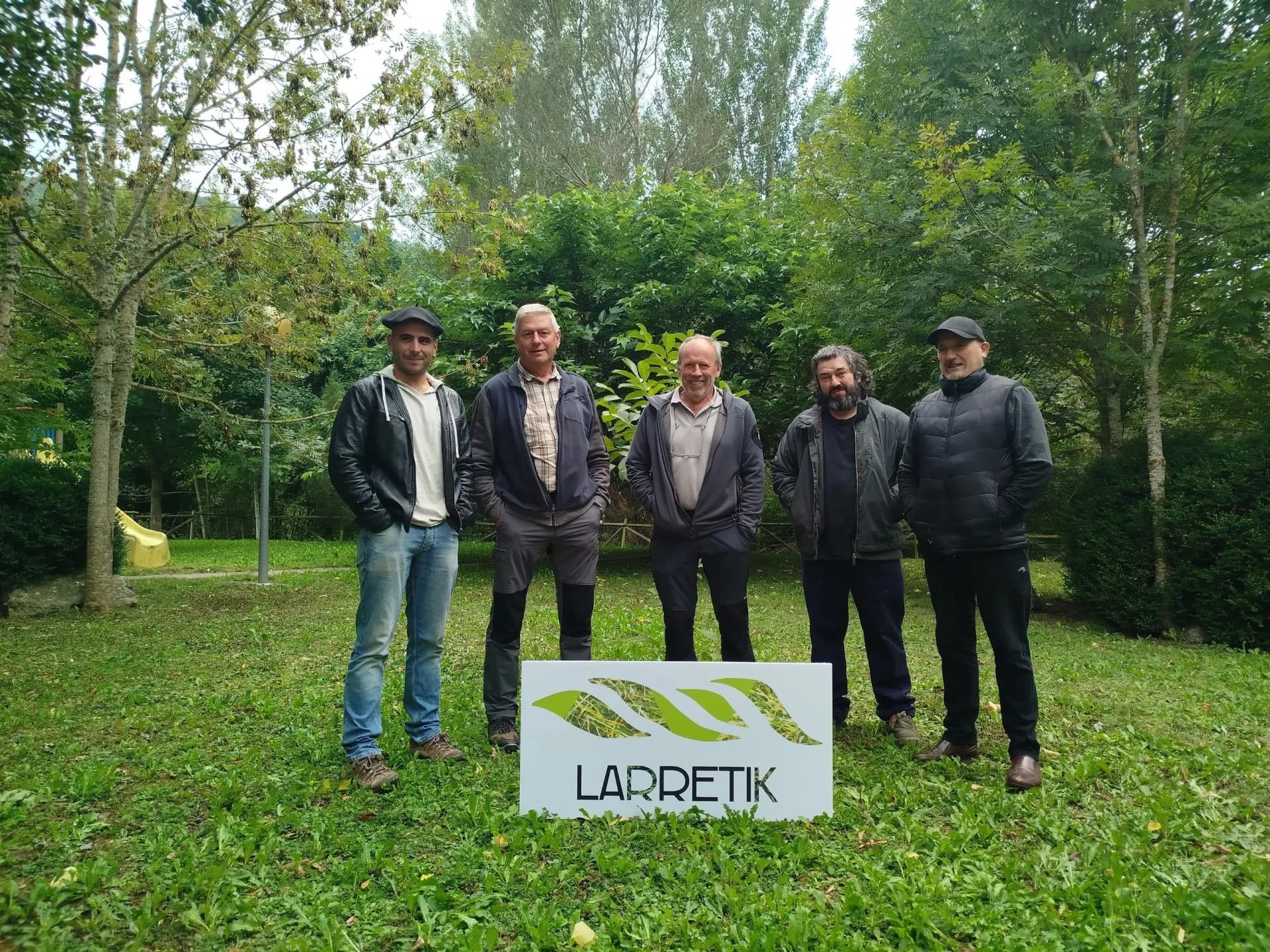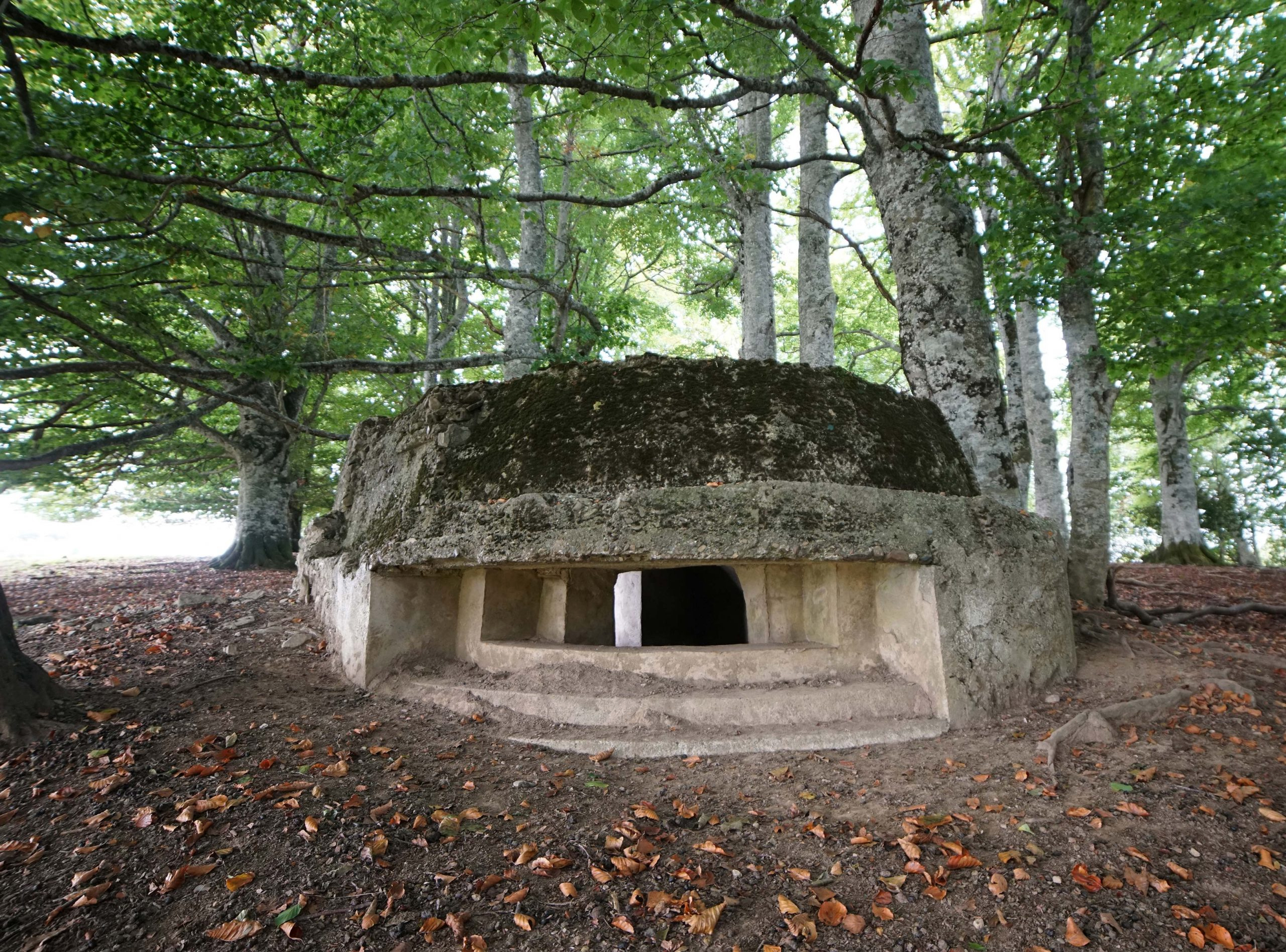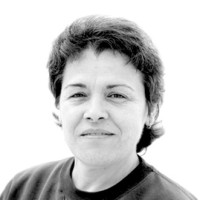"Only boosting tourism is fostering dependency"
- He is mayor of Uztárroz and since last August he has been chairman of the Roncal Valley Commission. It is the first woman to enter this position. Born and raised in Pamplona, he decided to go to the town and there he is happy. Fidela Bernat is the great-grandson of the last ‘euskaldun’ in the Roncal Valley. Beautiful places, small population, growing tourism… Today Roncal’s challenge is not to become a theme park.
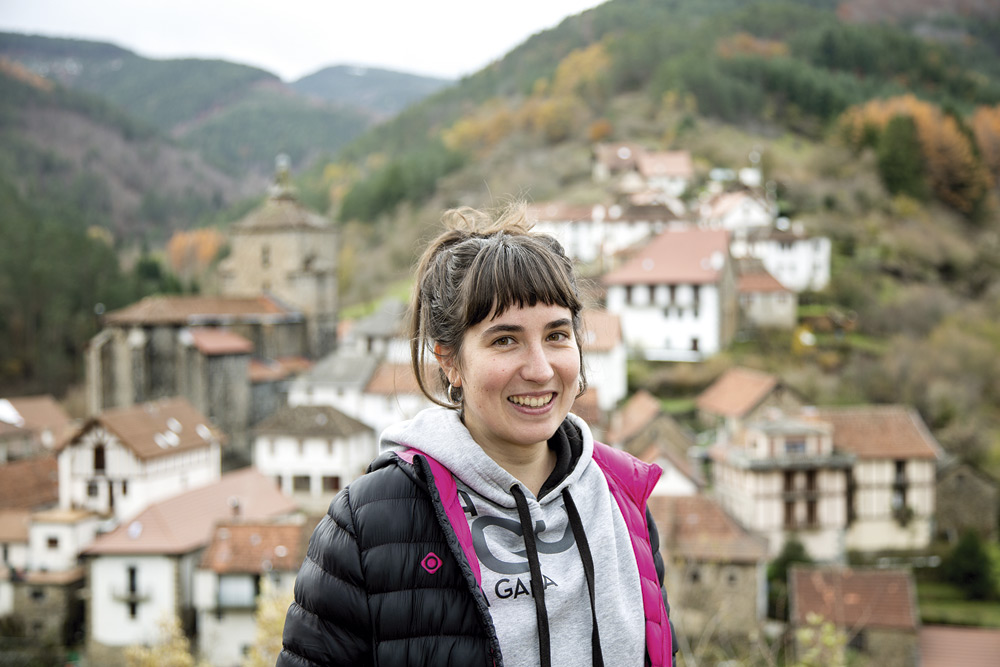
Irakaslea lanbidez. Iruñean sortu, baina Uztarrozera, aitaren herrira, bizitzera joatea erabaki zuen duela urte gutxi. Herri honetako alkatea da eta Erronkaribarreko Batzordeko burua.
Throughout the year there are 50 residents in Uztárroz and 141 registered. Why have you come from Pamplona to such a town?
The father is Uztárroz and the mother of Salbaterra de Ezkaba [Zaragoza, Spain]. I have always lived in Pamplona, but we always came on weekends and holidays. I wanted to try what it was like to live here and a few years ago I came here, I liked it and stayed in the village. The people have always seemed more appropriate to carry out a more sustainable and collective model of life.
You're a teacher and you have a job at school here, don't you?
Yes. My first job offer was in Ochagavía, then I spent a year in Pamplona, and since then I'm in Roncal's school.
What does a young man's life look like here?
I live very well. I don't get bored at all. I have a lot of ideas and a lot of things to do. I lack time to do everything.
In addition, there is a wide cultural offer and a village offers you plenty of possibilities to move around the mountain, practice the orchard, practise skiing and, above all, be with the people.
In some villages there are small shops and bakeries. A woman from Gallipienzo brings us fish every Tuesday. In summer, there are pickup trucks with fruits and vegetables, but many of us have vegetable gardens and animals, and here we do a lot of self-consumption work.
The time of the orchards is not very long, because here spring starts late and winter comes soon, but I for example have many things by boat, frozen or dried for the whole year.
In these villages you can live very well and quiet. Some live in an urban way, like in the city, but I prefer rural life.
The worst thing is finding work and housing?
I would say that finding housing is harder than working. In these Pyrenean valleys there is the possibility of working in teaching and administration. I am in the City Hall and I see that it is difficult to find people for some jobs. In teaching it is also difficult to find substitutes because nobody wants to come. More technical work is not easily accomplished. In addition, there is a lot of temporary work in the services, especially in hospitality and tourism. In the first sector you have to fight for work, because if you don't get it from someone, you have to buy it or start from scratch, but there you have the opportunity. There's a lot of work for the people who are here. It is true that the job offer is not very varied, so you usually do not come to live here for work, but because you want to live here.
On the contrary, the dwellings are normally not rented, and the few that are sold are huge and mostly not restored. In general, the heating and maintenance of these casets is often very expensive.
"Throughout the Pyrenees we live about 5,200 people. In the Roncal Valley there are over 1,500 registered people, but 700-800 are here all year round.”
How many people live here?
About 5,200 people across the Pyrenees. In the Roncal Valley there are over 1,500 people censored, but 700-800 remain here all year round. In their day they reached 900 in Uztárroz. Now almost 200 in summer, but much less in winter. Last year we counted 45 people from Monday to Monday. The town changes radically from working days to public holidays.
Still, we're optimistic. We have come to live in the valley some young people, some from here and others from abroad: From Pamplona, from Catalonia, from the Spanish state, a few more distant immigrants…
Too many old people and too few children?
Yes, as in the whole Pyrenees. Very few children are born. Here, in Uztárroz, there are three and in January a new one will be created. If you're born every two years, it's not bad.
At school, we have about 80 students between the ages of 3 and 16. We have seen a dramatic decline, especially in the last five years.
Only two 3-year-old children have entered this year. Next year seven are going to come in, but unfortunately that is not the usual amount.
Do you see the risk of becoming a theme park?
Yes. At least that is what worries me. We have a lot of tourism and a lot of investment in the development of tourism, but I believe that more investment should be made in other initiatives to boost the local productive economy. Only boosting tourism is ultimately encouraging dependency. We reserve for the enjoyment of all their peoples and resources and we must think how far this is a healthy economic model. It is good that some of our income comes from tourism, but that is not our main income. Reorient development in a different way.
How?
Strengthening the primary sector. An in-depth analysis is needed. The natural resources we have here, wood, livestock, renewable energies… all of this must be exploited effectively. Tourism seems to be the easiest source of income, but in the long term we must try to promote production. Our products, cheese, for example, need proper channels for marketing and less inconvenience. Now there are fewer shops around us and we have to negotiate with the big sellers as possible. Globalization is devouring us. Moving from micro to macro is very difficult for small cheesemakers.
In addition, we have to be clear that as consumers we can all do a lot. We have to be aware of what it costs to make food, for example, and be prepared to pay for it, perhaps through the administration...

There is less and less snow on the mountain. Is that also worrying for ski slopes and schools here?
Forecasts are not good because of climate change. At the moment it does well and it employs a lot of people. These small businesses are also looking for alternatives for times when there is no snow, such as the Nordic marches. There are very active people and I think we have the ability to create things, but we also need to strengthen the primary sector because it is now very obsolete in both age and development.
Livestock less and less and now again bear. They do not agree with the government’s proposals. Why?
Yes, it is. It's a very profound subject. When we met with the government in November, I tried to relocate the discomfort caused by the decision to bring bears. It's not a bear, it's not a bear. Here the most serious thing is that they have made their plans without consulting us. All these decisions bring us a major transformation and do not ask us if we are willing to make those changes. They've passed over us.
A lot of people are trying to absorb all of this. This is not the only or the most important factor causing the loss of livestock, but it was the one we were lacking. The people who live here are the ones who take care of all this and there are some management rights. The passage above them has caused us a great deal of pain and indignation. We must make a thorough diagnosis of the environment. Extensive livestock farming is known to be very beneficial in maintaining biodiversity, but this, for example, is not promoted as much as the bear. There is no planning to protect this kind of livestock that is about to disappear. In many places where there were grasslands, there's now forest, and that's what you don't talk about.
In Uztárroz they have just closed a farm and it has not been for the bear or for retirement. There are many factors that need to be looked at.
Is the aid granted for bear attacks not sufficient?
No, and it is not easy to get them. To start with, you must prove that this sheep has been attacked directly by the bear and bring his body. To do this, the first thing you have to do is find it. In addition, with the money they give you, you don't recover your sheep, that kind of sheep you have, from the race you've grown and improved for years. And also, you have to do a lot of papers. Bureaucracy is very complex and nobody helps the pastor in it. It's an overload. The damage is much more than the dead: sheep that shake and flee, abortions…
What new measures does the Government propose in particular?
Two auxiliary pastors were installed this summer. In addition, GPS and other communication systems have been put in place to know where the bear is, and from now on more measures have been announced: virtual locks, colours that warn of the passage of the bear, sheep collars that make noise, mastines, etc. The use of these dogs, for example, is difficult, as they are not very easy animals and are not very compatible with tourism. I, however, do not say no to these measures and we will have to prove whether they work, but what we want to make clear is that there is a lot of anger here, because there are many people who see that they have brought us the bear with the intention of leaving it there and that we have nothing but to accept it.
Is there a debate about hunting among young people here?
No. It's a commonplace thing. Hunting of wild boar, deer and boar. It's another way to take advantage of the mountain. Hunters also open a lot of roads and help keep the mountain clean. Along with sportsmen and pastors, they are the most dedicated to the mountain.
It has to be said that it is a very masculinized activity. By the way, they could take advantage of them to work other masculinity models.
What is your job at the Roncal Valley Board?
In the Valley there are seven municipalities, Burgui, Vidángoz, Garde, Roncal, Urzainki, Isaba and Uztarroze, and their mayors and other representatives make up the Commission. It is my job to convene and organize meetings as the mayors of a people do. My way of working is to consult it all with the members of the committee.
Innovation in the local administration of Navarre is underway. Of the twelve new counties, the Pyrenees will be the smallest in terms of population. Is it going to be a big change for you?
As far as I am aware, we will continue to have the competences that we have now. The Secretary, the Financial Controller and other workers are expected to be in common within the region. That is why, and thinking that to some extent you can lose the character of each people, some are suspicious. However, I see it positively because we will all be stronger together.
Is the relationship with Ipar Euskal Herria maintained?
Not too much. They have made the border a dividing one. We have a twinning agreement with Larraine and we meet every year in a festive atmosphere. In July we celebrated the tribute of the Three Cows with the Bearnesa, but that is where the relationship remains. We are now participating in an interesting cross-border project called Belarouat for the promotion of natural heritage, tourism and the local economy here, Garazi, Ereta and Laskun. Thanks to this project, for example, we will reopen the shelter in Belagua shortly.
How do you value the work of the Pyrenees Women’s Association and the Women’s Network?
In this region, the movement of women is very strong and sustained. This year the XIX Congress has been held. We want to show that we too have something to say and do. Groups have great potential and, furthermore, bring together women of all ages. They're very active groups. On 8 March, for example, we decided to do strikes and demonstrations not in Pamplona, but in our villages, and we made large caravans. It was a success.
You are the great-grandson of the last Basque in the Roncal Valley.
She was the mother of her grandmother, her father. He died at the age of 93, the year I was born. Fidel has become a referent because he was the last to die, or at least the last to meet. Probably at that time there would still be some other Basque, but he was best known for the many interviews that they made him. I don't want to mystify it, but it's true that in recent years he became aware of the loss of Euskera and made it clear that he didn't want that. Their desire was for the children to learn Basque. He said to our father and his brothers, “Let these young people learn Basque.” This has been the case in general in Roncal and throughout the Pyrenean area.
Fidela
Jakingo bazenu... jakingo bazenu zuretzat hain arrunta zen hura, hain etxekoa… zein garrantzitsu bilakatu den! Erronkariko uskararen erreferente-harribitxia zara!
Zenbat elkarrizketa, zenbat galdera: “Nola esaten zaio honi? Eta besteari?”. Eta zuk ongi esaten zenuen, bai: “Hauek harrapatu nahi naute, nola ez dut ba jakinen nola esaten zaion honi! Haiek esaten dutenaren berdina da-eta!”.
Zu agian ez zinen konturatzen, baina altxorra eraman zenuen zurekin eta horrek altxor bilakatu zaitu zu ere, Fidela Bernat, erronkarieraren azken hiztuna.
“Zergatik ez zenigun transmititu? Zergatik ez genuen jaso?” galdetu diogu maiz gure buruari. Jakin dugu, bai, azken urteetan argi esan zenuela zure ondorengoek euskara jakin behar zutela, euskara(z) bizitu behar zutela. Eta hala izan da! Zure indarrarengatik, uskararekiko erakutsitako maitasunagatik, gogoagatik... Azkenik euskara heldu da zure familiara, Uztarrozeko eta Erronkaribarko kaleetara.
Bihotzean zeneraman Erronkaribarra, bere lurrak, bere ohiturak, bere hotsak, hizkuntza... Harrotasunez, azken momentua arte. Orain Erronkaribarko euskaldunak dira bihotzean, harrotasunez, oroimenean gorde zaituztenak.
Eta horregatik zure indarrak oraindik dirau, hemengo larre eta herrietan.
Izan zinetelako gara!
Mila esker guztioi!
Jone
The Pyrenean valleys of Aezkoa, Salazar and Roncal would be a demographic desert of 3.8 square kilometres of population density (with an average of 68.1 inhabitants per square kilometre). In addition, 6.3% of this population would be older and the eastern Pyrenees would be an... [+]
Morning news. The ski resort at the top of Irati, managed by the Public College of Zuberoa, has decided to proceed with the final sawing, as they will be in snow again this year. I remember that about twenty years ago, in a special issue of Pyrénées Magazine, they announced... [+]
If you look at the Pyrenees on a map, they're like a line. Moreover, if someone tells us to paint the Pyrenean mountain range, we would surely plant the mountains together, although it looks something like what in English they call skyline. This image of the saw allows us to... [+]









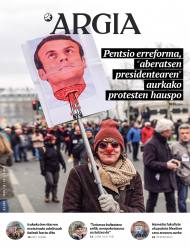

_Glaciar.png)

